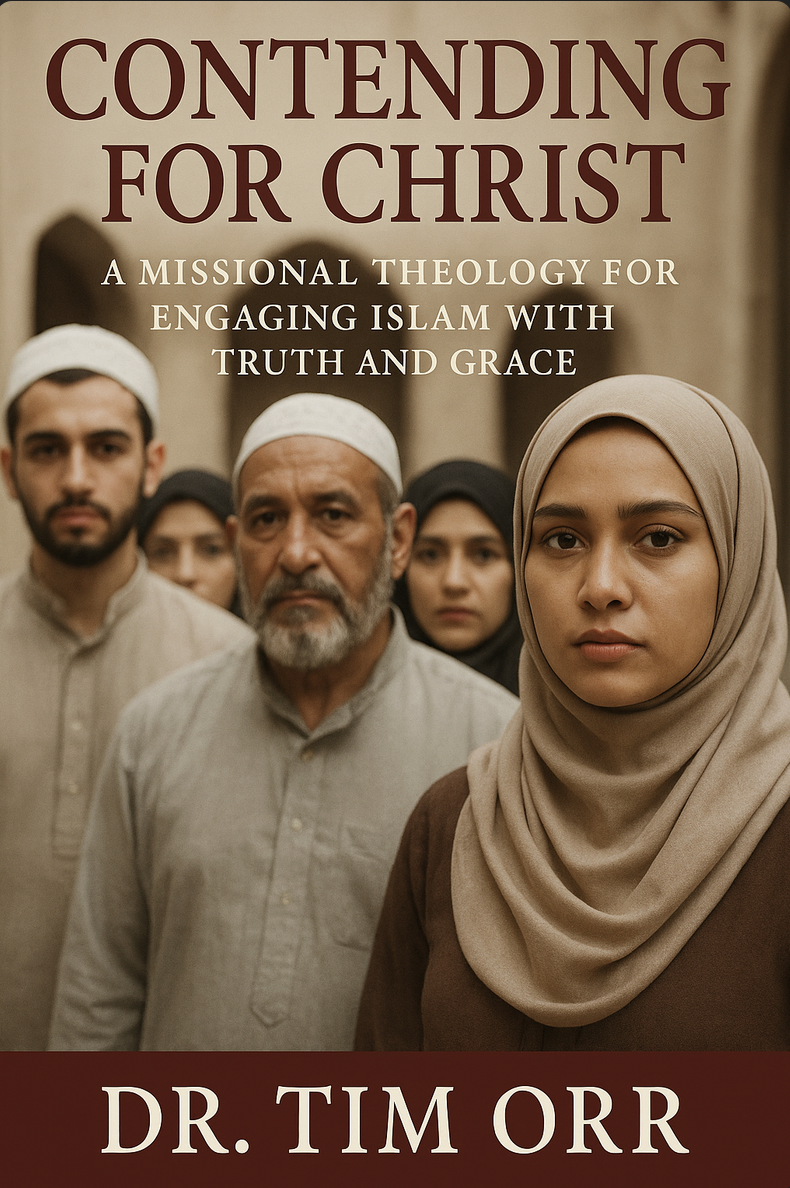

By Dr. Tim Orr
We are living in a pivotal moment for Christian engagement with Islam. The global migration of Muslims, the rise of Islamist ideologies, and the shifting dynamics of religious pluralism in the West have all converged to make the Christian-Muslim encounter one of the defining missiological challenges of our age. Yet too often, our response has been marked by either fear and avoidance or superficial dialogue devoid of theological clarity. We need a better way that neither retreats from truth nor compromises on grace.
That’s why I’m writing Contending for Christ. This book is a call to recover the biblical model of bold, Spirit-empowered engagement, grounded in the gospel of Jesus Christ and exemplified most powerfully in the ministry of the Apostle Paul. I aim to develop a missional theology—not just a strategy—that equips the Church to proclaim Christ faithfully in the face of Islam’s theological challenges and spiritual strongholds.
Over the past decade, my ministry among Muslims—through evangelism, interfaith dialogue, academic study, and mentoring—has convinced me that Paul offers the Church a crucial template for this task. He engaged hostile worldviews, contended for the truth of Christ in spiritually dark places, and suffered deeply to make Jesus known. Paul was not merely a missionary strategist but a theologian on mission, and his theology was forged in the crucible of suffering, opposition, and cultural complexity. That’s exactly what’s needed today.
This book unfolds in four major sections, each containing several chapters that build a theological framework and practical pathway for engaging Islam in a way that is faithful, clear, and compelling:
Section 1: The Apostle Paul—A Model for Engaging Islam
This opening section develops a Pauline missiology for our current context. In a world where Islam presents both a theological counter-narrative and a deeply entrenched social reality, Paul’s incarnational ministry among Jews and Gentiles offers profound guidance. These chapters will explore his theology of mission, contextual sensitivity (e.g., Acts 17), and Spirit-led courage in the face of persecution. We’ll look at how Paul planted churches in hostile settings, navigated religious pluralism, and communicated gospel truth in culturally accessible ways, offering a rich template for ministry to Muslims today.
Section 2: Paul the Misunderstood Apostle
Paul is often the primary target of Islamic polemics. Many Muslims believe he distorted the original message of Jesus, replacing tawhid (absolute monotheism) with the Trinity and the law with a false doctrine of grace. Ironically, some Christians have also reduced Paul to a system builder, disconnected from Jesus. This section addresses both of these distortions. Each chapter will defend Paul’s apostolic authority, Christ-centered theology, and deep continuity with Jesus’ message. We’ll recover Paul as a faithful steward of divine revelation, whose writings remain indispensable for Muslim ministry.
Section 3: Paul’s Use of Polemics
Here we confront a tension in modern Christian engagement: Can we be bold and loving? Paul shows us that the answer is yes. These chapters examine how Paul used polemics—not to destroy, but to persuade and protect. He confronted false gospels, exposed idolatry, and named spiritual strongholds, all while weeping over the lost and striving for their salvation. We will explore his rhetorical techniques, theological arguments, and pastoral motivations, applying them to contemporary Islamic objections to Christ’s divinity, the cross, and the reliability of Scripture. In a climate where Christians often shrink back from controversy, Paul calls us to “contend for the faith” with clarity and compassion.
Section 4: Ministry to Muslims Through the Eyes of Paul
The final section moves from theology to practice. What does it look like to minister to Muslims through Paul’s eyes? These chapters will address today's lived realities of Muslim ministry—spiritual warfare, suffering, honor-shame dynamics, discipleship of Muslim-background believers (MBBs), and the need for gospel resilience in hostile contexts. Drawing from Paul’s letters, his experience of persecution, and his theology of power-in-weakness, this section equips readers to love Muslims deeply, speak truth boldly, and persevere faithfully. Paul helps us see that the gospel is not just true—it is powerful and worth suffering for.
Who This Book Is For
I’m writing this book for those on the frontlines of gospel ministry among Muslims: missionaries who feel the weight of spiritual opposition, seminary students preparing for long-term service, mission leaders seeking theological clarity, and professors who train the next generation of Christian workers. It’s for pastors, evangelists, and apologists who long to proclaim Christ clearly without compromising grace. And it’s for anyone who believes the gospel is not just something to be believed, but something to be contended for.
Publication and Prayer
With a target publication date of August 2025, I hope this book will serve as both a theological compass and a pastoral companion. In an era when truth is contested and grace is often misunderstood, Contending for Christ seeks to call the Church back to the cross—to the place where Paul began and ended his ministry, and where all faithful engagement with Islam must begin: not in triumphalism, but in cruciform love.
Who is Dr. Tim Orr?
Tim serves full-time with Crescent Project as the assistant director of the internship program and area coordinator, where he is also deeply involved in outreach across the UK. A scholar of Islam, Evangelical minister, conference speaker, and interfaith consultant, Tim brings over 30 years of experience in cross-cultural ministry. He holds six academic degrees, including a Doctor of Ministry from Liberty University and a Master’s in Islamic Studies from the Islamic College in London.
In addition to his ministry work, Tim is a research associate with the Congregations and Polarization Project at the Center for the Study of Religion and American Culture at Indiana University Indianapolis. His research interests include Islamic antisemitism, American Evangelicalism, and Islamic feminism. He has spoken at leading universities and mosques throughout the UK—including Oxford University, Imperial College London, and the University of Tehran—and has published widely in peer-reviewed Islamic academic journals. Tim is also the author of four books.
